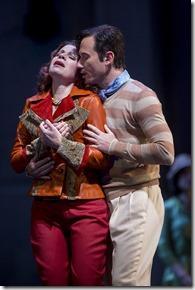
Don Giovanni
Music by Wolfgang Amadeus Mozart
Libretto by Lorenzo Da Ponte
Directed by Robert Falls
at Civic Opera House, 20 N. Wacker (map)
thru Oct 29 | tickets: $32-$244 | more info
Check for half-price tickets
Read review
A phenomenal reinvigoration of classic with long Chicago history
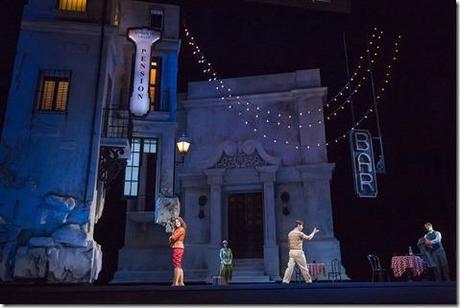
Lyric Opera of Chicago presents
Don Giovanni
Review by Clint May
The most lascivious Libertine in history opens the Lyric’s 60th season with considerable style and panache. Technically flawless and, of course, brilliantly composed, Don Giovanni ranks near the top of any opera lover’s must-see list – indeed, the Mozart opera was the first work ever produced by the current incarnation of the Lyric. This production is a luscious interpretation from vocals to visuals and an absolutely worthy successor to the Giovanni’s of Lyric’s past.
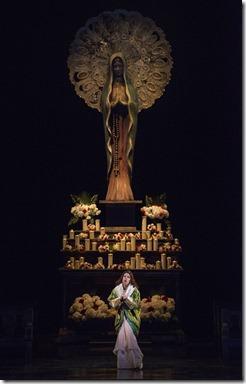
Renowned director Robert Falls of Goodman fame sets the stage with a bold hand but maintains that ambiguity of perception (even with the heavy-handed moralizing at the end). This is aided by the masterful interpretation by Kwiecien in his signature role. Now with over a decade of playing Giovanni under his belt, Kwiecien brings a languid world-weariness that makes the famed anti-hero disgustingly enviable in his disregard for social stricture and pitiable in that it brings him no happiness. It’s a point driven home as we view him through the spurned peasant Elvira’s (Ana María Martínez) heart as she chases him down. As his much-put-upon and strangely sycophantic servant Leporello, Kyle Ketelsen is a master of the recitative in a role quickly becoming his own signature. Antonio Poli, Michael Sumuel and Silvestrelli flesh out the ancillary male characters with aplomb and nuance.
As great as the men are, it’s the ladies who truly rule the night. It’s their character transformation in the course of their campaign against moral turpitude made manifest that makes the tragedy more compelling. The three sopranos are equally stunning in power and presence with their distinctive arias, though it’s Martinez’s transformation from an amusing harpy to a compassionate redeemer that won my heart (even if the object of her affection is beneath her). Though it would be difficult to create a feminist interpretation of this work, it’s still interesting that it’s the women who are shown as capable of personal growth while the men remain stunted. Even poor Leporello can only scamper to the bar for another bad boss after his former is dragged—table and all—into Hell itself (and what a scene that is).
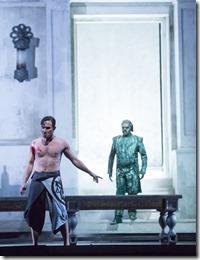
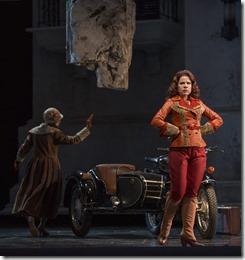
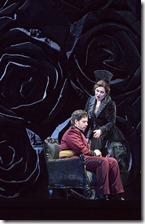
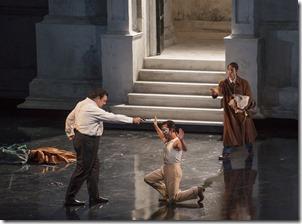
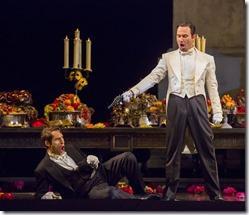
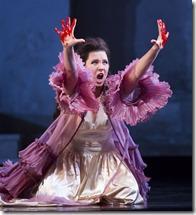
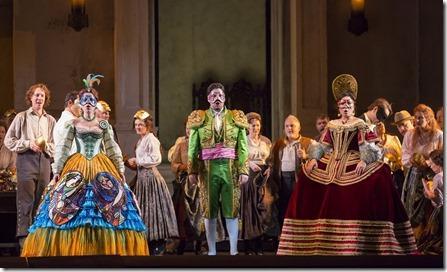
Director Falls has chosen 1920s Spain as the backdrop for the drama and it’s a stunning success. There are frequent tableaux created by the combination of Walt Spangler’s outsized sets and Ana Kuzmanic’s opulent costuming that are works of art unto themselves. Look to a ballroom scene full of gold masks or a cemetery statue capable of supernatural acquiesce for just a few of many examples. The sumptuous nature of it all is perfectly fitted to the grandness of Mozart’s exquisite composition, brought to wondrous musical life by the inimitable Sir Andrew Davis and Michael Black. Falls also adds a few scenes of graphic aggression that give a more somber, contemporary tone to Giovanni’s womanizing. Be sure to read Martha C. Nussbaum’s essay “Rape, Revenge, Love: The Giovanni Puzzle” in the program to gain some in-depth perspective.
There’s a few scenes of graphic aggression added by Fall’s that give a bracing, contemporary tone to Giovanni’s womanizing. Be sure to read Martha C. Nussbaum’s essay Rape, Revenge, Love: The Giovanni Puzzle in the program to gain some in-depth perspective on the women in this tale.
What other superlatives can you lay at the altar of one of the great works of the Western canon? This is indispensable in not just opera but theatrical experience in general thanks to the marshaling of so many towering talents. This is opera at its most transportive.
Rating: ★★★★
Don Giovanni continues through October 29th at Civic Opera House, 20 N. Wacker (map). Tickets are $32-$244, and are available by phone (312-322-2244) or online through their website (check for half-price tickets at Goldstar.com). More information at LyricOpera.org. (Running time: 3 hours 30 minutes, includes an intermission)
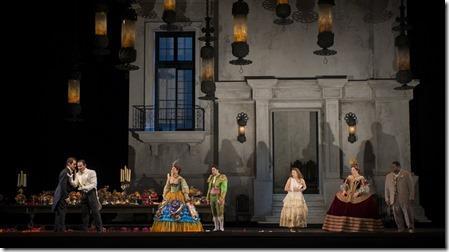
Photos by Todd Rosenberg and Michael Brosilow
artists
cast
Mariusz Kwiecien (Don Giovanni), Marina Rebeka (Donna Anna), Ana María Martínez (Donna Elvira), Kyle Ketelsen (Leporello), Antonio Poli (Don Ottavio), Andriana Chuchman (Zerlina), Michael Sumuel (Masetto), Andrea Silvestrelli (Commendatore), Katherine Coyl, Michael Dailey, Nicholas Harazin, Kate LoConti, Kiley B. Moore, Josh Odor (actors)
behind the scenes
Robert Falls (director), Sir Andrew Davis (conductor), Walt Spangler (set design), Ana Kuzmanic (costume design), Duane Schuler (lighting design), Michael Black (chorus master), August Tye (choreographer), Sarah Hatten (wigmaster, makeup design), Nick Sandys (fight director), Matthew Ozawa (asst. stage director), John W. Coleman (stage manager), Philip Morehead (stage band conductor), William C. Billingham (recitative accompanist), Eric Weimer, William C. Billingham (musical preparation), Colin Ure (projected supertitles), Todd Rosenberg, Michael Brosilow (photos)
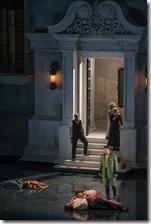
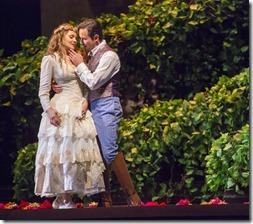
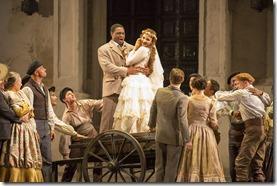
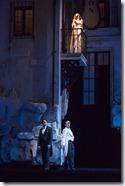
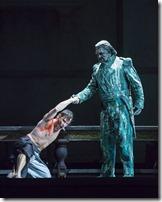
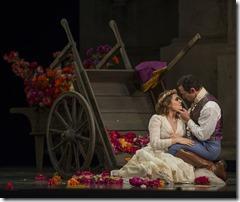
14-0956

